|
Author
|
Topic: Background on Apollo 11 heatshield lucite
|
j2
New Member Posts: 5
From:
Registered: Mar 2022
|
 posted 04-22-2022 02:28 PM
posted 04-22-2022 02:28 PM
  
Around 2009, I was in contact with cS member David Worrow, who at the time had a large collection of space history artifacts. I was in middle school at the time, and after a lengthy discussion about space history, in exchange for an autograph from Ed Buckbee, David sent me an Apollo 11 heatshield lucite that he said he had made.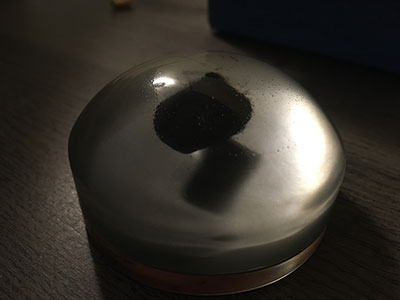 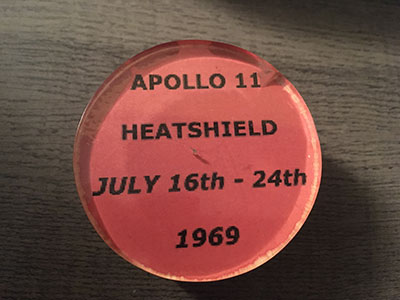
I've done a fair amount of reading about other heatshield lucites, including the cS forum post here. I haven't seen anything that looked similar to the piece I have, which is not surprising, since (if I recall correctly), it was made by a private individual. I'm curious if anyone has seen similar lucites in the past, or who knew David at the time that he would have produced this (or maybe even still knows him). I don't doubt the authenticity of the piece, as David had an amazing collection, however I would like to know more about it, if possible. Thank you all for your help! 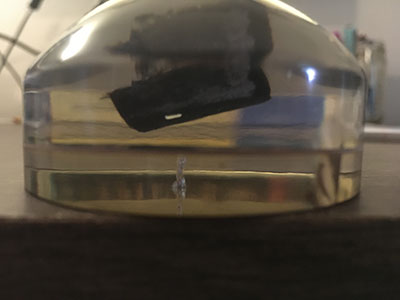 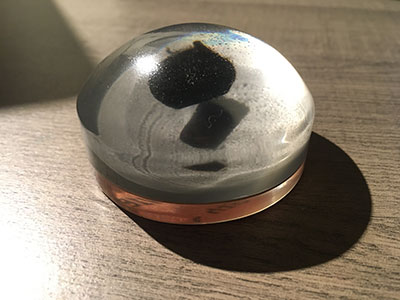
|
mode1charlie
Member Posts: 1319
From: Honolulu, HI
Registered: Sep 2010
|
 posted 04-25-2022 06:47 PM
posted 04-25-2022 06:47 PM
   
I bought a couple of pieces from David c. 2011, including an Apollo 11 lucite - but it looks nothing like yours. The one I bought looks like this. I have no information at all on the style of lucite you mention here. |
Larry McGlynn
Member Posts: 1372
From: Boston, MA
Registered: Jul 2003
|
 posted 04-25-2022 08:30 PM
posted 04-25-2022 08:30 PM
   
My question is where did Mr. Worrow get that piece of heat-shield? Did you ever ask him about the background of the original object that he got the heat-shield from before he put it in a lucite? |
j2
New Member Posts: 5
From:
Registered: Mar 2022
|
 posted 04-28-2022 02:27 PM
posted 04-28-2022 02:27 PM
  
At the time, I didn't think of asking much about the history of the piece inside the lucite, and unfortunately, I lost contact with David a while ago. quote:
Originally posted by mode1charlie:
The one I bought looks like this.
Thanks for posting the link to the image. That looks like a much more polished version, similar to the examples in the "Types of lucites: 'Official' NASA vs others" forum linked in the post. |
Ken Havekotte
Member Posts: 3424
From: Merritt Island, Florida, Brevard
Registered: Mar 2001
|
 posted 04-28-2022 04:02 PM
posted 04-28-2022 04:02 PM
   
Just out of curiosity, I'm having a hard time in viewing a closeup of the CM-107's heatshield as embedded in the home-made acrylic. But just from a quick glance, and nothing more, it doesn't appear to be similar to known flown/used Apollo aft heatshield components that I know of and own. In no way am I trying to "judge" this artifact, but of course, I would need to examine it more closely in order to form a personal opinion. I don't think the heatshield pertains whatsoever to the Kapton insulation tape layers mentioned by John, but rather to the aft conical brunt-end back-side of CM-107. |
j2
New Member Posts: 5
From:
Registered: Mar 2022
|
 posted 04-28-2022 05:07 PM
posted 04-28-2022 05:07 PM
  
Ken, thanks for your comments. I took new pictures with better quality lighting.I also noticed a small heart-shaped piece of metal placed directly beneath the heatshield. Has anyone seem something similar before? 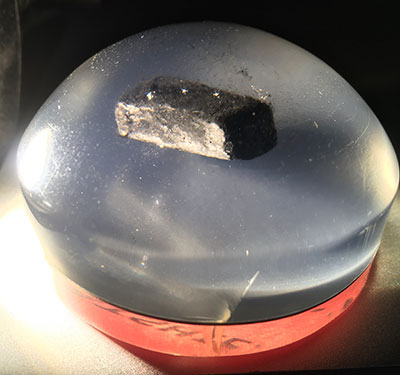 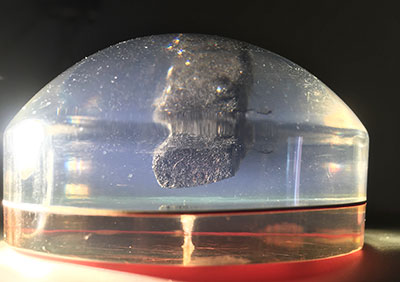
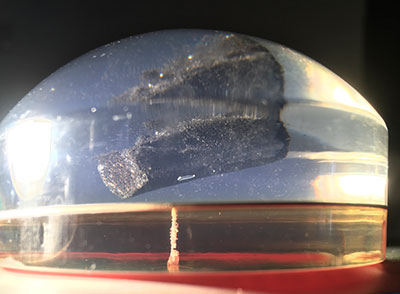
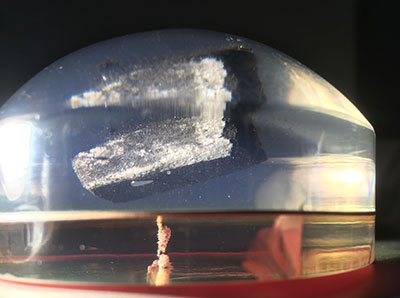
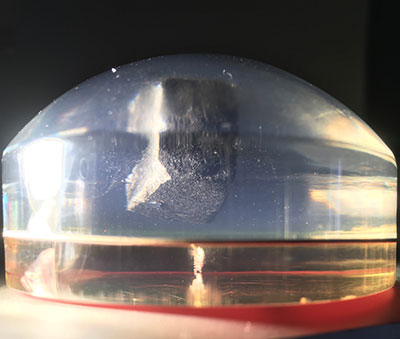
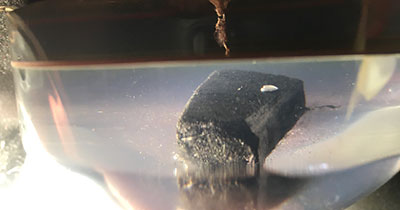
|
MartinAir
Member Posts: 174
From:
Registered: Oct 2020
|
 posted 04-28-2022 06:08 PM
posted 04-28-2022 06:08 PM
   
Similar charred fragments are in those unofficial home made lucite displays. What are the visible reddish dots? |
Pete Sarmiento
Member Posts: 88
From: Fort Washington, MD, USA
Registered: Mar 2006
|
 posted 04-28-2022 08:30 PM
posted 04-28-2022 08:30 PM
   
Just wonder whether this piece was chip out of the spacecraft when is was on board the USS Hornet? How large is it physically? Maybe its noticeable where this piece is taken from the capsule! |
j2
New Member Posts: 5
From:
Registered: Mar 2022
|
 posted 04-30-2022 09:07 AM
posted 04-30-2022 09:07 AM
  
The red dots are just reflections from the lighting. The longest edge of the piece measures abut 0.7-0.8 inches as best I can tell, so I doubt it would be noticeable where it actually came from. |
NicDavies
Member Posts: 43
From: Tobermory, Argyll, Scotland
Registered: Jan 2019
|
 posted 04-30-2022 06:50 PM
posted 04-30-2022 06:50 PM
   
I think the "heart shaped piece of metal" might actually be a trapped bubble of air from the encapsulation process. |





















